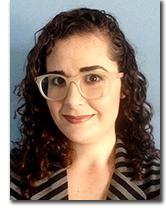Biology faculty Rachel Yoho publishes work studying climate change, energy technologies in undergraduate education

 Rachel Yoho, a visiting assistant professor in the Department of Biology working with Project Dragonfly, has published a research article, "Climate change and energy technologies in undergraduate introductory science textbooks," in the journal, Environmental Communication.
Rachel Yoho, a visiting assistant professor in the Department of Biology working with Project Dragonfly, has published a research article, "Climate change and energy technologies in undergraduate introductory science textbooks," in the journal, Environmental Communication.
Her research investigates the presentation of pressing environmental topics, including global warming/climate change, fossil fuel energy technologies, alternative/renewable energy technologies, nuclear energy, and related environmental impacts.
"Climate change and energy technologies are topics important in education, politics, and the media," Yoho said. "Our students are encountering these topics in the classroom and in their daily life. It's incredibly important to understand the variation in terminology and content used in these discussions in educational materials."
Yoho published this work with co-author and collaborator Bruce Rittmann, director of the Biodesign Swette Center for Environmental Biotechnology at Arizona State University and a Regents' Professor in the School of Sustainable Engineering and the Built Environment. He is a world-renowned researcher in environmental biotechnologies and a recent recipient of the Stockholm Water Prize.
Through a page-by-page analysis of over 15,000 pages of textbooks, Yoho and Rittman identified patterns in terminology use and content presented. As the first study of its kind in both scope and magnitude, their article provides insights into the complexities of undergraduate education for these topics at the forefront of public discussion.
Of the textbooks studied, they found a split in the defining terms used, whether they are "global warming" or "climate change." Their use did not depend on the discipline but varied individually by the book. Additionally, if a definition was provided for the terms, climate change definitions tended to appear earlier in the textbooks.
Yoho and Rittmann also investigated energy technologies and related environmental issues. They presented comparisons between the discussion of fossil fuels and alternative/renewable energy technologies.
"We're preparing our students to be productive, engaged citizens who will likely have careers that cross disciplines and address global challenges in creative ways," Yoho said. "Focusing on our educational methods — especially for topics like climate change and energy technologies — will serve our students now and in the future."
She added, "As pressing issues and research topics become increasingly interdisciplinary, we must think about how we present these topics in the classroom. While each STEM discipline has its own metaphorical 'language,' we have students moving between these classes on a daily basis. The content we discuss and the words and phrases we use, especially for these topics students encounter in daily life, are vitally important."
Environmental Communication is an international, ranked peer-reviewed research journal with a broad emphasis on the multiple intersections of environmental issues, communication, and society. The journal is associated with the International Environmental Communication Association.
For more information, contact Yoho (yohora@MiamiOH.edu) or visit Rachel Yoho, PhD.

